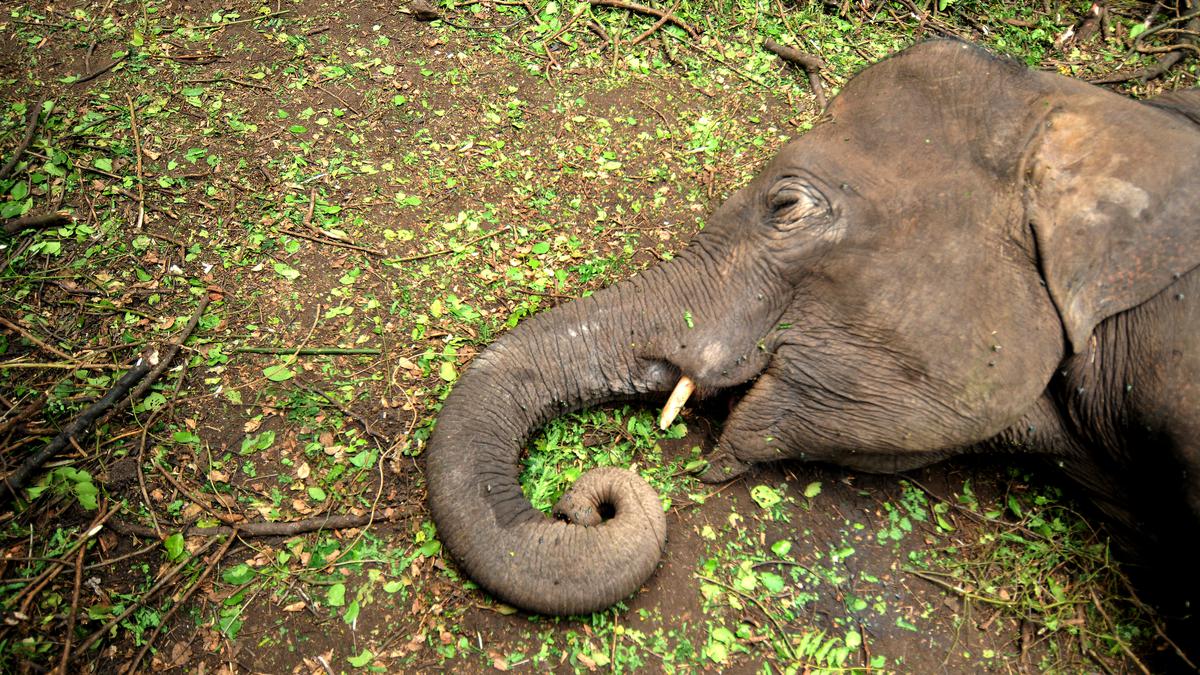
Pregnancy-related complications probable reason for female elephant’s death near Coimbatore
The Hindu
Female elephant in Coimbatore died of pregnancy-related complications, post-mortem reveals. Foetus was in final stage of gestation, likely died before mother. Veterinarians believe dystocia caused foetus' death, leading to mother's. 16 wild elephants have died in Coimbatore Forest Division this year.
A female wild elephant that was found dead in a check-dam inside a reserve forest near Coimbatore on Sunday (September 17) evening could have died of pregnancy-related complications, as per the post-mortem examination findings.
Forest Veterinary Officer A. Sukumar, who headed the autopsy on Monday, said the foetus of the elephant could have been between 20 and 22 months of gestation.
“The foetus was more putrefied than the mother’s carcass. This could mean that the foetus died much before the mother died. The pregnancy complication is believed to have led to the mother’s death,” he said.
The female elephant, aged between 22 to 25, was found dead in the check-dam of Kinathukuzhi stream falling under Boluvampatti block II reserve forest when field staff of the Forest Department were patrolling the area on Sunday evening.
Dr. Sukumar performed the post-mortem examination along with T. Karthikeyan, Assistant Veterinary Surgeon from the Government Veterinary Hospital, Narasipuram, in the presence of senior officials and a representative from a non-governmental organisation on Monday. The elephant did not have external injuries.
According to the veterinarians, the foetus was in the final stage of pregnancy. “The foetus was found in the full grown stage with hairs. The amniotic sac was not ruptured. The elephant is believed to have undergone a dystocia (difficulty during labour) due to which the foetus could have died. This could have eventually caused the mother’s death,” Dr. Sukumar said.
He added that an elephant’s gestation period is between 18 and 22 months, the longest of all mammals. The carcass and the foetus were buried in the forest after samples were lifted for forensic examinations.

“Writing, in general, is a very solitary process,” says Yauvanika Chopra, Associate Director at The New India Foundation (NIF), which, earlier this year, announced the 12th edition of its NIF Book Fellowships for research and scholarship about Indian history after Independence. While authors, in general, are built for it, it can still get very lonely, says Chopra, pointing out that the fellowship’s community support is as valuable as the monetary benefits it offers. “There is a solid community of NIF fellows, trustees, language experts, jury members, all of whom are incredibly competent,” she says. “They really help make authors feel supported from manuscript to publication, so you never feel like you’re struggling through isolation.”

Several principals of government and private schools in Delhi on Tuesday said the Directorate of Education (DoE) circular from a day earlier, directing schools to conduct classes in ‘hybrid’ mode, had caused confusion regarding day-to-day operations as they did not know how many students would return to school from Wednesday and how would teachers instruct in two modes — online and in person — at once. The DoE circular on Monday had also stated that the option to “exercise online mode of education, wherever available, shall vest with the students and their guardians”. Several schoolteachers also expressed confusion regarding the DoE order. A government schoolteacher said he was unsure of how to cope with the resumption of physical classes, given that the order directing government offices to ensure that 50% of the employees work from home is still in place. On Monday, the Commission for Air Quality Management in the National Capital Region and Adjoining Areas (CAQM) had, on the orders of the Supreme Court, directed schools in Delhi-NCR to shift classes to the hybrid mode, following which the DoE had issued the circular. The court had urged the Centre’s pollution watchdog to consider restarting physical classes due to many students missing out on the mid-day meals and lacking the necessary means to attend classes online. The CAQM had, on November 20, asked schools in Delhi-NCR to shift to the online mode of teaching.









